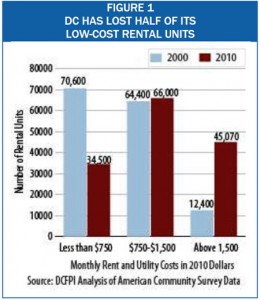A new report out today from DCFPI shows that the District’s supply of affordable housing is rapidly disappearing. Sharp increases in rents have led to a 50 percent decline in low-cost rental units, those with rent and utility costs of less than $750 a month. At the same time, a sharp rise in home values have led to DC to lose more than 70 percent of its low-cost homes valued at $250,000 or less.
But while housing costs are rising quickly in the District, the incomes of DC households are not keeping pace. In fact, incomes for the bottom 40  percent of DC households have remained stagnant over the last decade.
percent of DC households have remained stagnant over the last decade.
One consequence is more DC households are now paying more than half of their income on rent, including three-fifths of DC’s lowest-income families. When housing consumes so much of a family’s income, there is little left over to pay for other basic necessities like food, clothing and transportation.
The impact is not just on low-income households, however. A growing number of moderate income households face severe housing burdens today than they did at the start of the decade. In fact, just over six percent of households that earned between 30 and 50 percent of area median income ‘ about $31,000 to $51,000 for a family of four ‘ paid more than half of their income on housing in 2000. By 2010, that number had risen to 31 percent.
The change in the District’s housing market means that more and more low- and moderate-income families will face challenges staying in ‘ or moving to ‘ the District. Since the private market produces very little affordable housing on its own, it is critical that the District support the creation and preservation of affordable housing.
The District has a variety of tools that can help address the affordable housing needs of low- and moderate-income residents, but the Great Recession really put the brakes on most local programs. Most programs have simply been maintained at their prior-year levels, meaning that there has been no progress against the dwindling supply of affordable housing in the private market. And there have been significant reduction in DC’s Housing Production Trust Fund’ the main source for affordable housing production and preservation. Resources to the trust fund fell quickly in the recession and have faced significant cuts in both the fiscal year 2012 budget and the current fiscal year 2013 budget being debated by the DC Council.
Mayor Gray has included restorations to the trust fund and other housing programs on his priority revenue list. DCFPI encourages the Mayor and Council to find a way to begin reinvesting in the programs DC has that can build, preserve and ultimately help the District stem the tremendous loss of affordable housing in DC.
